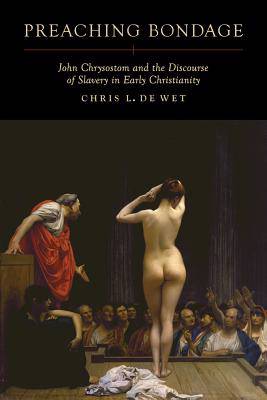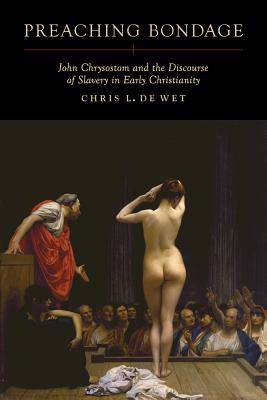
- Afhalen na 1 uur in een winkel met voorraad
- Gratis thuislevering in België vanaf € 30
- Ruim aanbod met 7 miljoen producten
- Afhalen na 1 uur in een winkel met voorraad
- Gratis thuislevering in België vanaf € 30
- Ruim aanbod met 7 miljoen producten
Zoeken
Preaching Bondage
John Chrysostom and the Discourse of Slavery in Early Christianity
Chris L de Wet
Hardcover | Engels
€ 161,45
+ 322 punten
Omschrijving
Preaching Bondage introduces and investigates the novel concept of doulology, the discourse of slavery, in the homilies of John Chrysostom, the late fourth-century priest and bishop. Chris L. de Wet examines the dynamics of enslavement in Chrysostom's theology, virtue ethics, and biblical interpretation and shows that human bondage as a metaphorical and theological construct had a profound effect on the lives of institutional slaves. The highly corporeal and gendered discourse associated with slavery was necessarily central in Chrysostom's discussions of the household, property, education, discipline, and sexuality. De Wet explores the impact of doulology in these contexts and disseminates the results in a new and highly anticipated language, bringing to light the more pervasive fissures between ancient Roman slaveholding and early Christianity. The corpus of Chrysostom's public addresses provides much of the literary evidence for slavery in the fourth century, and De Wet's convincing analysis is a groundbreaking contribution to studies of the social world in late antiquity.
Specificaties
Betrokkenen
- Auteur(s):
- Uitgeverij:
Inhoud
- Aantal bladzijden:
- 331
- Taal:
- Engels
Eigenschappen
- Productcode (EAN):
- 9780520286214
- Verschijningsdatum:
- 21/07/2015
- Uitvoering:
- Hardcover
- Formaat:
- Genaaid
- Afmetingen:
- 147 mm x 229 mm
- Gewicht:
- 612 g

Alleen bij Standaard Boekhandel
+ 322 punten op je klantenkaart van Standaard Boekhandel
Beoordelingen
We publiceren alleen reviews die voldoen aan de voorwaarden voor reviews. Bekijk onze voorwaarden voor reviews.







